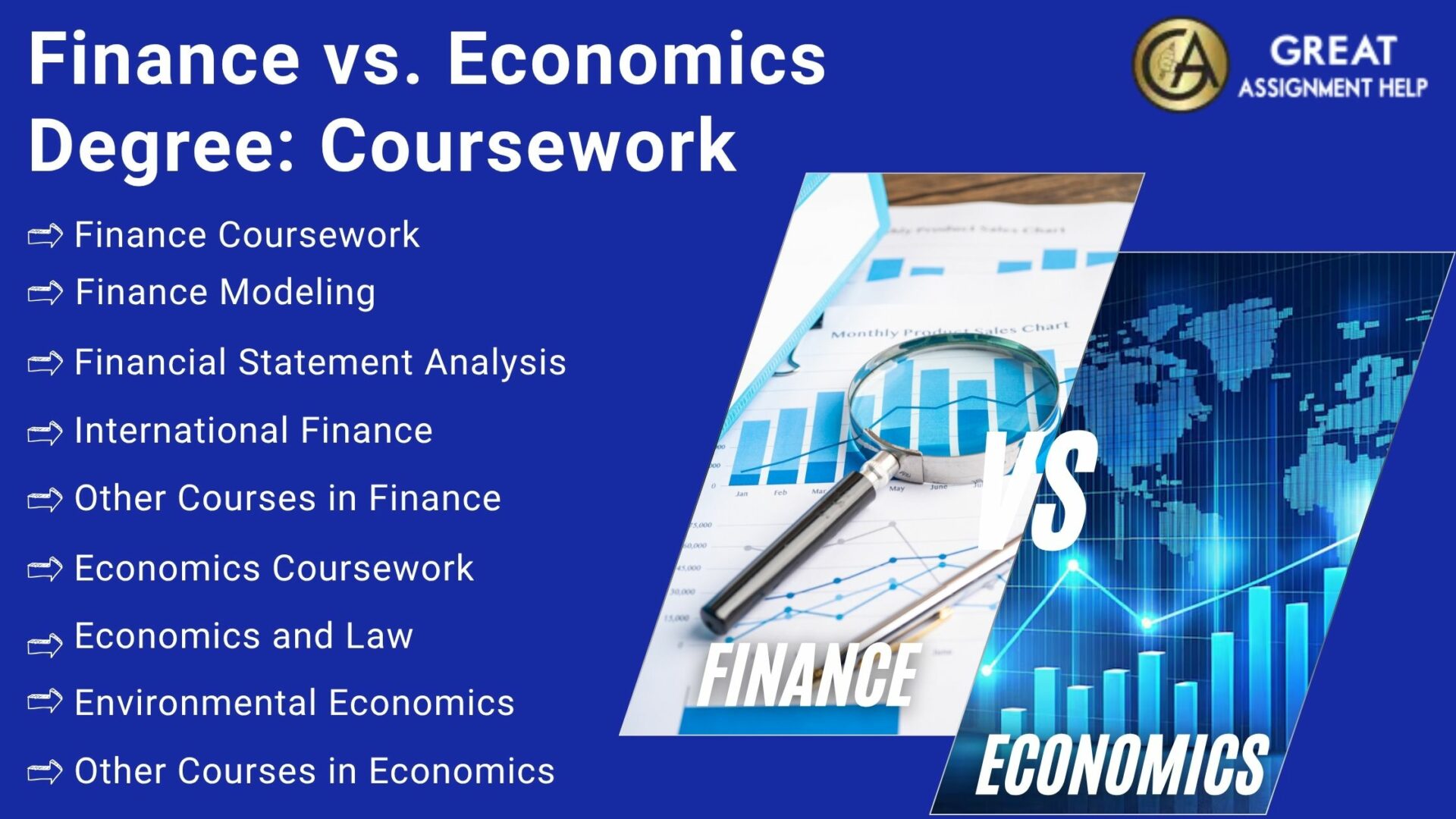Finance vs. Economics Degree: Which One Should You Choose in 2025? Finance is about managing money, investments, and markets. Economics looks at how the economy works and affects people. If you like working with money, choose finance. If you want to understand the economy, pick economics. Both offer good jobs.
Finance and economics impact our daily lives in many ways, from global policies to managing personal budgets. Although they are connected, finance and economics are two different fields that sometimes seem similar. Finance focuses on things like financial markets, investments, and managing money. Economics looks at public policies, how economies work, and the basics of both microeconomics and macroeconomics. Generally, knowing these differences is important if you are thinking about studying or working in these areas. If you are curious to understand about finance vs. economics, read this blog. Here, we have explained the main differences between finance and economics degrees, along with the career paths, job roles, and salary options in each field.
Finance vs. Economics: An Overview
It is normal for you to get confused about whether to choose either a finance or economics degree in 2025. In case you are in such a dilemma, before choosing, make sure to know about finance and economics.
Finance
Finance is the study of how money, investments, and other financial assets are managed. It covers many activities, such as getting, using, and distributing money to meet financial goals. People, businesses, and governments all need a good understanding of finance to manage their money wisely.
Finance expert helps clients make smart investment choices, manage risks, and plan for future growth. They focus on things like capital, income, and financial resources. The main areas of finance are public finance, corporate finance, and personal finance.
As finance is a complex subject, many students find it hard to understand and apply it in real-life situations. Hence, several websites offer expert Finance Assignment Help services online. With expert guidance, students can better understand tough topics like risk management, financial modeling, and portfolio planning. This support not only helps with completing assignments but also builds a strong foundation for future success in school and a career in finance.
Economics
Economics is the study of how people and organizations use resources and make decisions in the marketplace. Economists look at supply and demand to understand how the economy works and what affects consumer behavior. They also help governments plan for the future, predict economic trends, and understand how new laws or changes might affect the economy.
Macroeconomics and Microeconomics are the two main areas of economics. Macroeconomics looks at the big picture, like how the whole economy works, including things like inflation and overall productivity. On the other hand, macroeconomics focuses on individual choices, like how people decide what to buy and how those decisions affect the supply of goods and services.
Economics can be a tough subject because it involves both theory and real-world analysis. That is why many students find Economics Assignment Help services useful. Usually, getting expert support will make it easier to understand complex topics and improve both learning and academic performance.
Finance vs. Economics Degree: Coursework

Here, let us explore the differences in the coursework of a finance and economics degree
Finance Coursework
Since finance and economics degrees share some basic topics, you might take a few similar courses at the start. These could include subjects like public finance, microeconomics, and basic business studies. As you continue with your studies, the courses will become more focused on your chosen field.
Here are some finance courses you might take:
Finance Modeling
In a financial modeling course, you will learn how to build models using data from documents like income statements. Also, you will practice recording past financial data and using it to spot trends and make future predictions.
Financial Statement Analysis
In this course, you will learn how to read and understand financial documents like balance sheets and income statements. Additionally, you will learn how to use this information, along with cash flow and credit analysis, to make smart financial suggestions.
International Finance
In this course, you will learn about trading, exchange rates, and the risks of dealing with foreign currencies. Also, you will explore how businesses operate globally to increase their profits.
Other Courses in Finance
- Personal Finance
- Financial Planning
- Business Valuation
- Corporate Finance
- Real Estate Finance
- Financial Accounting
- Risk Management
- Taxation and Tax Planning
- Portfolio Management
- Advanced Financial Management
- Financial Markets and Institutions
- Investment Analysis
- Derivatives and Hedging
These courses help you get ready for many different jobs in the finance industry, whether you are interested in tax planning, studying markets, or managing investments.
Economics Coursework
If you choose to study economics, you will take courses like:
Economics and Law
This course explores how laws such as contracts, property rules, and criminal laws influence the economy. You will also study the history of economic ideas and how effective they are in relation to the law.
Environmental Economics
This area looks at how the economy is affected by the environment and natural resources. Here, you will learn about problems, solutions, and ideas like scarcity, economic value, and environmental regulations.
Other Courses in Economics
- Economic Theory
- Behavioral Economics
- Macroeconomics
- Development Economics
- Public Finance
- Labor Economics
- Game Theory
- Environmental Economics
- Economic Policy
- International Economics
- Econometrics
- Microeconomics
- Financial Economics
These courses prepare you for a variety of jobs in the economics sector, whether you want to work in policy making, economic research, or analyzing market trends.
Career Paths in Finance and Economics
Careers in economics and finance can be similar in some ways. For example, you might work as a consultant in both areas. The big difference is the kind of information you study and how you use it to help clients. Some jobs in the finance and economics fields are:
- Financial Planner
- Public Sector Economist
- Actuary
- Development Economist
- Credit Analyst
- Treasury Manager
- Labor Market Analyst
- Corporate Finance Officer
- Economic Consultant
- Risk Manager
- Environmental Economist
- Portfolio Manager
- Policy Analyst
- Tax Advisor
- Insurance Analyst
- International Trade Specialist
- Behavioral Economist
People with finance degrees often earn a little more than those with economics degrees because jobs in finance, like investment and money management, usually pay more. But both degrees can lead to good salaries, especially as you gain experience and take on higher-level or specialized jobs.
Finance vs. Economics: Which Degree Should You Choose?
Choosing between a finance degree and an economics degree depends on what you like and what you want to do later. Finance is about managing money, investments, and financial markets. It teaches you how to handle budgets, study investments, and make money decisions. Jobs in finance include financial analyst, portfolio manager, and financial planner.
Economics is about how people, businesses, and governments use resources and how these choices affect the economy. It covers things like supply and demand, economic rules, and how markets work. With an economics degree, you can work as an economic consultant, policy analyst, or researcher.
If you enjoy working with numbers and managing money, finance could be the right choice. But if you are curious about how economies work and want to understand broader economic issues, economics might suit you better. Both degrees offer strong job opportunities and can lead to rewarding careers. Consider what interests you most before making your decision.
Conclusion
Based on your interests and career ambitions, you can choose the finance or economics degree. When pursuing a degree in such courses, you may experience certain challenges. In such situations, get Assignment Help from the finance or economics experts from our team. They will help you in enhancing your subject comprehension, accurately finishing your assignments on time, and boosting your grades.



